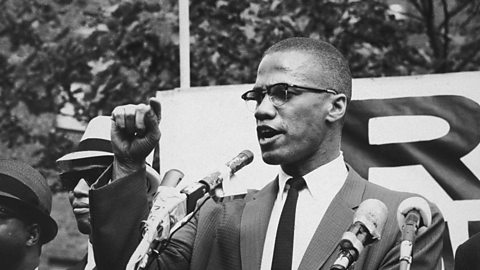Black nationalism
In the mid-1960s, groups who believed in black nationalismThe idea that black people should be proud of their race and rely on each other to improve their lives, rather than accept help from white people. were active in the United States of America. They saw no need to win the support of white Americans. They sometimes believed it was justifiable to use violence in order to achieve a separate black nation - an idea known black separatismThe desire to set up a separate nation for black people.
The Nation of Islam
One such group was the Nation of Islam ã a religious and political organisation. The Nation of Islam argued that equality for black Americans could only be achieved by black and white Americans living in separate states. Many people, including other black Americans who supported the civil rights movement, saw the Nation of Islam as hating white people. The group initially had very few members when it was founded in the 1930s, but by 1962 there were around 40,000 members.
Some features of the Nation of Islam were:
- a belief that black people should be proud of their race and all work together
- the view that white people were ãdevilsã
- a desire to set up their own separate black nation
- readiness to use violence to defend black people against white oppression
Malcolm X

One of the most influential figures in the Nation of Islam was Malcolm X. Like many black people he experienced racism. As a child his home was set on fire and Malcolm believed a local white supremacist group was responsible. While he was in prison he was introduced to the Nation of Islam and joined the organisation. When he left prison in 1952, he formally changed his name from Malcolm Little to Malcolm X, abandoning the name given to his family when they were enslaved. He travelled across America spreading the message of the Nation of Islam.
Initially, Malcolm X closely followed the religious and political teachings of the Nation of Islam. He ran the organisationãs branch in Harlem, New York, and became a spokesperson for black nationalism.
Like Martin Luther King Jnr.A Christian minister who believed in peaceful protest without using violence and who was a key figure in the US civil rights movement., Malcolm X became well known for his passionate speeches. However, he was critical of the methods used by King and his followers. He said Kingãs supporters were wasting their time trying to win over white Americans. He described the March on Washington as the ãfarce on Washingtonã. Another contrast to King was that Malcolm X was prepared to say that violence might be necessary to achieve freedom for black Americans, but only in self-defence.
We want freedom by any means necessary. We want justice by any means necessary. We want equality by any means necessary.
The civil rights movement was mostly focused on the southern states. In contrast, Malcolm X concentrated his efforts on urban black American communities in the northern states, such as New York. He worked to set up education schemes for young black Americans, who made up the majority of the members of the Nation of Islam. Malcolm X helped young black Americans to reconnect with their African heritage. Many of these young people would go on to be part of the Black Power movement.
Some of Malcolm X's achievements are shown below.
Malcolm X and the Organization of Afro-American Unity
Malcolm X left the Nation of Islam in 1964 after a series of disputes with the leadership of the organisation. For example, he was not allowed to collaborate with other civil rights campaigners outside of the organisation. After leaving the Nation of Islam, he joined Dr Martin Luther King Jnr in Washington, DC, to support the creation of the Civil Rights Act. He also went on the HajjThe pilgrimage Muslims make to Makkah (Mecca) during the twelfth month of the Islamic calendar. The Hajj is the fifth and final pillar of Islam. to Mecca to understand more about his faith.
After leaving the Nation of Islam Malcolm X founded the Organization of Afro-American Unity (OAAU), which emphasised that civil rights groups should work together, regardless of colour. After Malcolm X founded the OAAU, he became popular with a wider audience. However, his actions also displeased some members of the Nation of Islam. He received death threats and his home was firebombed - which Malcolm suspected was a response to him leaving the group.
The assassination of Malcolm X
In 1965, while he was giving a speech in Harlem, New York, Malcolm X was assassinated. His assassination shocked the American public. After his death, his autobiography was published, his ideas became very well known and his work inspired civil rights camapigners.